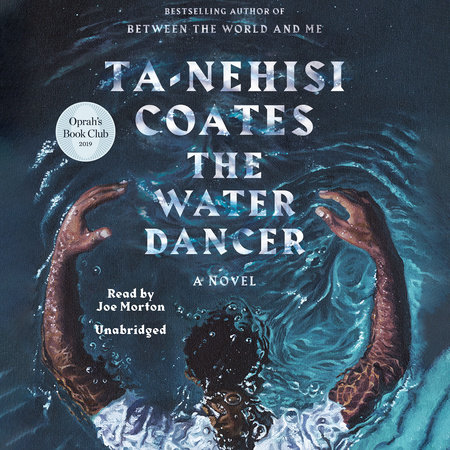[av_hr class=’custom’ height=’50’ shadow=’no-shadow’ position=’center’ custom_border=’av-border-fat’ custom_width=’100%’ custom_border_color=’#372a55′ custom_margin_top=’30px’ custom_margin_bottom=’30px’ icon_select=’no’ custom_icon_color=” icon=’ue808′ font=’entypo-fontello’ admin_preview_bg=”]
Ta-Nehisi Coates’ most overwhelming task in authoring The Water Dancer is overcoming the rampant cultural inclination toward schadenfreude—that is, the pleasures derived from observing the misfortunes of another, especially a particularly successful other. His achievements as an essayist, christened by Toni Morrison as the second coming of James Baldwin, already have earned him the skeptical ire of preeminent scholar-cum- sociopolitical-critic Cornel West. Wading into the rarefied world of powerhouse literary fiction is for Coates a daring swim in perilous and dare I say shark-infested waters. Doing so while very likely under the tutelage of the late Morrison herself, however, vastly increases his odds of success. And, similar to the complexities of Toni Morrison’s works, this is not an easy read. We are caused to linger over each word, juicing each sentence for the fullness of its nourishment.
Novelist Coates sustains his deft hand at constructing uniquely powerful and lyric sentences for which his essays have garnered due acclaim. He has stated that the book required ten years of authorship. That weight is apparent, and the struggle renders a fiction, which while not effortless, is not mired in anticipated tropes, excessive hyperbole, nor vapid descriptions. In this book, Coates displays an adept ability to illustrate settings and characters based on the nuanced actions of the characters he brings to life within his world. This does not feel like a novice effort. It is replete with the studied narrative devices that bring breadth and life to the pages. The result is a powerful exploration of magical realism in an antebellum setting with a clear nod to the classic Beloved that more than meets the task Ta-Nehisi Coates has set for himself. Task being indeed an operative word in what I find to be a queerly mystical uncovering of the peculiar institution at the heart of this work.
Coates rarely uses the words slave or slavery throughout the novel. He refers to the labors of plantation servitude as the Task and those forced to endure those labors are the Tasked. The enslavers, referred to as the Quality, discover themselves bound within their own institutions: The Whiteness of their own construction inextricably ensnares them. By juxtaposition, Coates explores the ways in which the Tasked are the talented, thoughtful, and creative embodiments that generate the social, cultural, and economic goods which the Quality are ill-equipped to produce. Due to their ineptitude and self-affirmed brilliance in the midst of their actual mediocrity, the Quality cause the collapse of their agrarian markets and rural estates.
Meanwhile, the magic resides within the Tasked. And so, the queerness here is not overtly one of sexual or gender identity expression, but one of dismantling the normative by exposing the hidden institutional histories and turning popular perceptions of enslavement on their heads. This telling bypasses many of the often-recounted daily tortures and horrors, refocusing our attentions instead on the efforts among the Tasked to create dignity and freedoms within the apartheid of daily life.
Hiram is the intellectually and magically gifted protagonist. He has a remarkable power of total recall, with the exception of memories of his estranged mother. That gift and the commensurate limitation are linked to his power of Conduction, the ability to instantaneously transport from one location to another. Hiram has the potential to become the conductor of his own Underground Railroad. He, however, is not in full control of his teleportation ability. His power is directly affected by his inability to fully conjure, and thereby confront, the pains of separation from his mother who in his younger days was sold to another far away plantation. His unique gifts mark him as outstanding among the Tasked and require that he keep his abilities on the down low.
Coates enhances his focus on dignity within the confines of the Task by emphasizing delayed satisfaction that toys with a further queering of the enslavement narrative as we follow Hiram through a sexual awakening of sorts. At age nineteen, he somewhat suddenly displays a romantic interest in Sophia, another of the Tasked and the concubine of a neighboring man of the Quality. Intentional or not, Coates establishes a non-normative and anti-stereotypical relationship: in Hiram’s rather advanced years this is the first consideration of an intimate interlude, which culminates in a drunken intertwining of the arms while gazing at the stars. The rather lengthy chaste courtship of these two, and Hiram’s lack of earlier sexual desires, runs counter to heteronormative expectations under optimal conditions, let alone in a context in which one’s potential love interest could be sold or otherwise unduly spirited away. In the midst of our greatest national tragedy, Coates brings us a self-conducted politics of respectability and access to a utopia represented by an Underground to freedom.
This queering of the cultural enslavement narrative questions the predominant perspectives on rebellion and revolution in the midst of the institutionalization of chattel slavery. The power of Conduction interrupted by the inability to remember the penultimate event of Hiram’s Tasking existence is a metaphor for the nation’s reticence to fully face, reconcile, and thereby become empowered by our history. The greatest gift of The Water Dancer is Coates’ intention to uncover the Underground and provide us a path to reimagining our tortured past. Toppling norms not only provides creative insights into what has been but proffers opportunities to create futures that challenge the dominant beliefs that structure our present.
[av_hr class=’custom’ height=’50’ shadow=’no-shadow’ position=’center’ custom_border=’av-border-fat’ custom_width=’100%’ custom_border_color=’#372a55′ custom_margin_top=’30px’ custom_margin_bottom=’30px’ icon_select=’no’ custom_icon_color=” icon=’ue808′ font=’entypo-fontello’ admin_preview_bg=”]
[av_one_half first] [/av_one_half]
[/av_one_half]
[av_one_half]Antonio Brown holds a Ph.D. in Political Science from the University of Michigan Ann Arbor. He contributed the autobiographical memoir “Strange Fruit” to the American Library Association Award winning anthology For Colored Boys. He has also contributed to the New York Times column “Room For Debate.” Brown has served as a Professor of Political Science at Loyola Marymount University in Los Angeles, California. He is a published academic and recipient of numerous awards including being named a National Science Foundation Fellow. He also has served as a scholar and researcher at UCLA and Irvine Foundation Fellow at Stanford University. Brown has been recruited to numerous boards of directors including the International Society of Political Psychology. He held office as a nationally elected member of the Board of Directors of the American Civil Liberties Union (ACLU) and has served as the President of the Board of Directors of the ACLU of Southern California. Brown also became a member of the Community Advisory Board of KCET Television (the Public Broadcasting Station [PBS] of Southern California). Antonio is a bonafide foodie and home chef, as well as a cocktail mixologist and enthusiast.[/av_one_half]
[av_hr class=’custom’ height=’50’ shadow=’no-shadow’ position=’center’ custom_border=’av-border-fat’ custom_width=’100%’ custom_border_color=’#372a55′ custom_margin_top=’30px’ custom_margin_bottom=’30px’ icon_select=’no’ custom_icon_color=” icon=’ue808′ font=’entypo-fontello’ admin_preview_bg=”]Sports Shoes | Nike – Shoes & Sportswear Clothing
